3.3. Files¶
Content → Files
The Files area is a repository, i.e. a document storage for folders and files, that you can use within your portfolio. Both folders and files are considered artefacts and as such can be added to a page. You may create any number of folders or sub folders. To view which sub folders and files sit within a folder, click on the folder name. Use the Home link to return to the top level folder directory.
You can arrange files and folders by dragging and dropping the icon in front of the file / folder name onto another folder icon. A suitably named and organised filing structure will help you with the long-term organisation and retrieval of your artefacts. If you want to move a file or folder out of a sub folder, move it onto the parent folder icon  .
.
You will find that some folders are automatically created by the system such as viewfiles or images. The viewfiles folder includes files from imported pages whereas the images folder includes your uploaded profile pictures. As with any other file, you can move them out of this folder and store them in a different folder.
Note
You can move files and folders to your heart’s content without having to re-link them in the pages where you use them. Also renaming them will not have a negative impact on links.
3.3.1. Upload a file¶
Before you upload a file, make sure that you are allowed to do so. For any artefacts that you publish in your portfolio, you must have the sufficient rights. That means:
- the artefact is your own or
- you are allowed to reproduce and distribute it, i.e. it does not violate any copyright legislation and
- the artefact also adheres to the Terms and Conditions of the Mahara site you are using
Note
It can be that you have to agree to an upload agreement before you can upload any files to your files area. The site administrator decides about that in Administration → Extensions → Plugin administration → Plugin type: artefact: file.
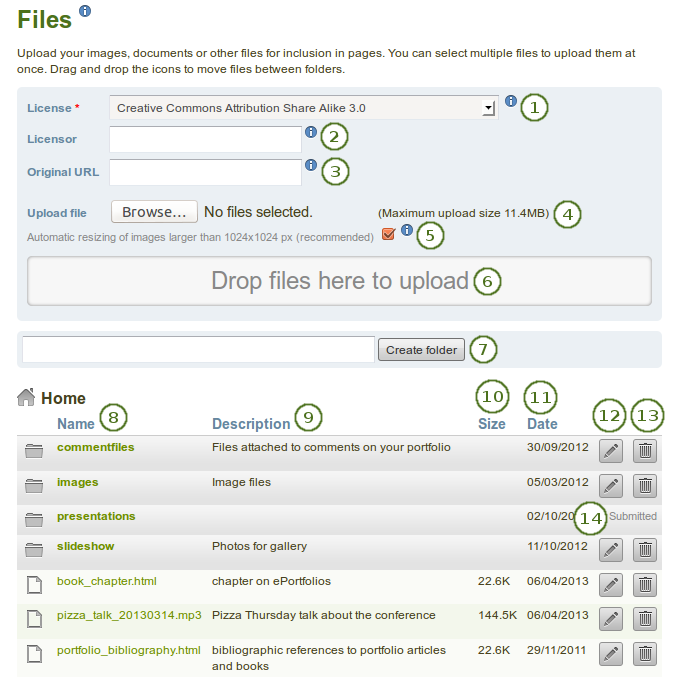
Upload a file
License: You see this field if the site administrator turned on license metadata. Choose the license for the artefact that you are about to upload. You can set your default license in your account settings.
Licensor: You see this field if the site administrator turned on license metadata. If you are uploading a file that somebody else created, you can attribute the work to them here and provide their name for example.
Original URL: You see this field if the site administrator turned on license metadata. If you are uploading somebody else’s file, provide a link to the original Internet address so that others can go there and view the original file.
Upload file: Upload a file by clicking on the Browse button to search for the file on your computer. Make sure that it is not larger than the maximum upload size that is shown in the parentheses.
If the site administrator turned on the image resizing option, you can decide whether you want to have your images resized if they are larger than the specified dimensions. This option is recommended to save space in your portfolio.
Instead of clicking the Browse button to upload files, you can drag and drop files from your computer directly onto the “drop zone”. You must still observe the maximum file size upload for each file and the maximum total file size cannot be exceeded either.
Note
This functionality is not available in all browsers. Generally, users of Chrome 7+, Firefox 4+, Internet Explorer 10+, Opera 12+ (Windows only) and Safari 6+ can use drag and drop.
Type the folder name and click the Create folder button if you want to create a folder before uploading files. Click the folder to upload files directly into it.
Name: You see all your folders and files that are not in folders listed in this table to access them easily.
Description: View the description of your folders or files to know quickly what the content of them is.
Size: The size of your files is displayed here.
Date: The date you created a folder or uploaded a file is shown.
Click the Edit button
 to edit folder or file properties. Continue with editing a file.
to edit folder or file properties. Continue with editing a file.Click the Delete button
 to delete a file or folder. If you use a file in a journal entry and / or on a page, you are warned before deleting the file so that you don’t delete it by accident.
to delete a file or folder. If you use a file in a journal entry and / or on a page, you are warned before deleting the file so that you don’t delete it by accident.If a folder or file is an artefact in a page that has been submitted, you are not able to edit or delete it.
Note
You can move your file to a folder by clicking on the icon before the file’s name and then dragging and dropping it onto the folder icon. Similarly, you can click on a folder icon and drag it onto another folder icon to move the folder into the second one.
3.3.2. Upload multiple files¶
You can upload multiple files at once in three different ways:
- You can upload multiple files when you are browsing for them after having clicked the Browse button. Hold down the Ctrl key (or Command key on a Mac) and click on all the files that you wish to upload at once.
- You can drag and drop multiple files into the drop zone.
- You can also place all files into a compressed file, a .zip file, and upload that to Mahara. This method allows you to upload multiple files from different folders on your computer at once. You can create a zip file from any number of files that you have selected in your document management program by making a right mouse click and selecting Compress… (or something similar).
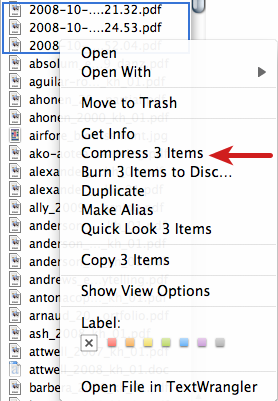
Zip files in the Finder under MacOSX
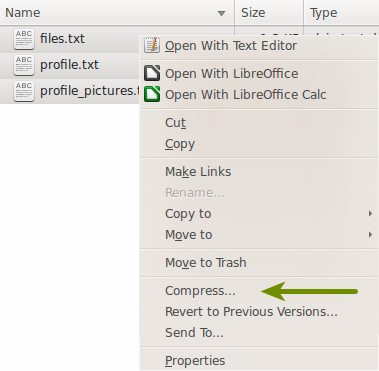
Zip files in Ubuntu’s Nautilus
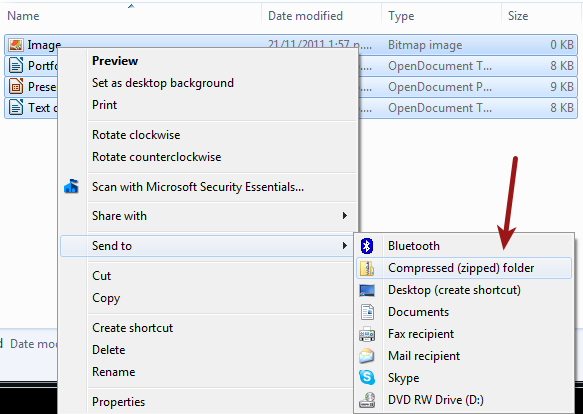
Zip files in Windows Explorer
Once you have uploaded your zip file to Mahara, you can unzip it there. Click on the Unzip button  next to the Edit button
next to the Edit button  . Please follow the on-screen instructions.
. Please follow the on-screen instructions.
3.3.3. Edit a file or folder¶
You can edit the properties of a file or folder at any time. The file does not have to be re-linked in portfolio pages, but the properties you changed will be updated automatically.
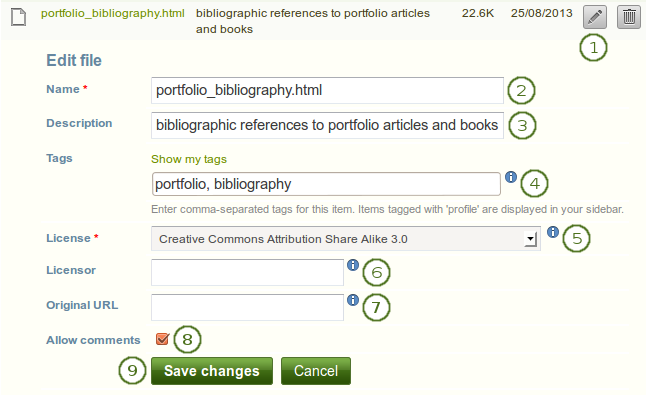
Edit a file
- Click the Edit button
 to edit folder or file properties.
to edit folder or file properties. - Name: Change the name of the file (or folder). It is not necessary to keep the file extension as Mahara stores it internally. However, it can be good to leave it in case somebody has problems opening the file if no default programme is associated with the file after downloading it. This field is mandatory and each file (or folder) must have a name.
- Description: Give the file (or folder) a description to find it again more easily.
- Tags: Give the file (or folder) one or more tags. You can choose from your existing tags by clicking on the Show my tags link and then selecting the tags. If you type your tags, separate them with commas.
- License: You see this field if the site administrator turned on license metadata. Choose the license for the artefact that you are editing.
- Licensor: You see this field if the site administrator turned on license metadata. If you are editing a file that somebody else created, you can attribut the work to them here and provide their name for example.
- Original URL: You see this field if the site administrator turned on license metadata. If you are editing somebody else’s file, provide a link to the original Internet address so that others can go there and view the original file.
- Allow comments: Decide if users should be allowed to comment directly on the file artefact page when they view it.
- Click the Save changes button to keep your changes or click the Cancel button to abort the action.
3.3.4.  Download folder content as a zip file¶
Download folder content as a zip file¶
You can download all files and folders within one folder in one go.
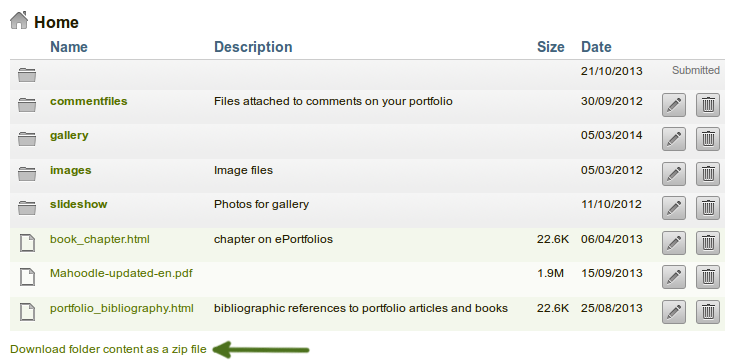
Download a filder as zip file
Click the Download folder content as zip file link in order to get a zip file which contains all files and folders of the current folder.
See also
Site administrators decide in the Artefact type: File settings for how long the zip file is kept on the server.
3.3.5. File quota¶
The site administrator of your Mahara site decides how much space you can have to store files. This can vary across institutions. You can check your file quota in the sidebar in your Files area.
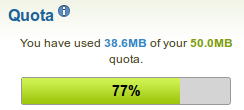
File quota